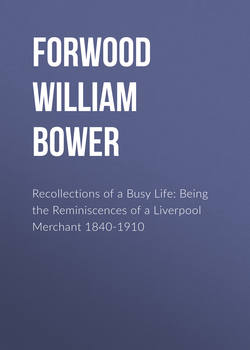Читать книгу Recollections of a Busy Life: Being the Reminiscences of a Liverpool Merchant 1840-1910 - Forwood William Bower - Страница 15
CHAPTER III.
LIVERPOOL
Society in Liverpool
ОглавлениеSociety was much more exclusive forty or fifty years ago than it is to-day. The old Liverpool families were looked up to with much respect.
The American war considerably disturbed Liverpool society, and brought to the front many new people. Liverpool became more cosmopolitan and democratic, but there was no serious departure from the old-world courtesy of manner and decorum in dress until the 'eighties, when it gradually became fashionable to be less exacting in dress, and the customs of society grew less conventional.
In the 'sixties people of wealth and position surrounded themselves with certain attributes of power and wealth, which gave to the populace some indication of their rank and their social status, and in manners they were reserved and dignified.
Their homes were in the country or in the fashionable suburbs of the city, and their importance was measured by the extent of their broad acres. A house in London, in which they dwelt for three or four months of the year, was the luxury only of the older families, or of those of great wealth; the fashion of having a flat in London, with a week-end cottage in the country, was not known – this has followed the more democratic tendencies of our times. The bringing of people together in our railway trains, in steamers, in hotel lounges, and foreign travel, have had a distinctly levelling influence. In the 'sixties some old county families still made their annual pilgrimage to visit their friends in the family coach, and the circle of their acquaintances was limited and exclusive. The family carriage with the rumble at the back was a dignified and well-turned-out equipage. The dress carriage, with powdered footmen, was commonly seen in Hyde Park, and was de rigeur at Court drawing rooms, then held in the afternoon; the array of carriages at these functions made a splendid show.
Motors may have the charm of convenience and speed, but can never replace the smart appearance of the well-turned-out carriage-and-pair.
The 'sixties were the days of crinoline and poke bonnets, and although the wearing of crinoline was much ridiculed, ladies' dress in those days was much more becoming and graceful than many of our more recent fashions, and girls have never looked more fascinating than when they wore their pretty little bonnets; but perhaps I may be called old-fashioned; as we grow older our view points change. We had many old maids in those days – we have none now – and the old ladies with their hair worn in dainty curls surmounted by a lace cap were picturesque, and looked their part.
The Wellington rooms, which were opened in 1814, were regarded as the centre of fashionable society.
These rooms, which are only used five times in each year, are unique in their exquisite proportions and their charming Adams' decorations unspoiled by the modern painter and decorator. The floor of the large ballroom is celebrated for its spring, being, it is stated, suspended by chains.
Admission to the rooms was carefully safeguarded, its members belonging almost exclusively to the families of position and standing. The balls were conducted on the strictest lines of propriety, carefully enforced by vigilant stewards, who would not admit of any rough dancing; and such a thing as kitchen lancers would not have been tolerated. Six or seven balls were given each year. The first before Christmas was often called the dirty-frock ball, as new frocks were reserved for the débutantes' ball, the first ball of the season. No supper was given, only very light and indifferent refreshments. The attendance gradually fell away, and it was felt that the time had arrived when something should be done to revive their interest. Accordingly, about 1890, during my presidency, the supper room was enlarged, electric light was introduced, and a supper with champagne provided, and in order to meet the extra expense the balls were cut down to five. These changes were very successful in increasing the attendance. There were great misgivings as to the introduction of the electric light, and its effect upon the complexions of the ladies. The old form of illumination by wax candles suffused a very soft light, but the candles were unreliable and often did damage to ladies' dresses.
